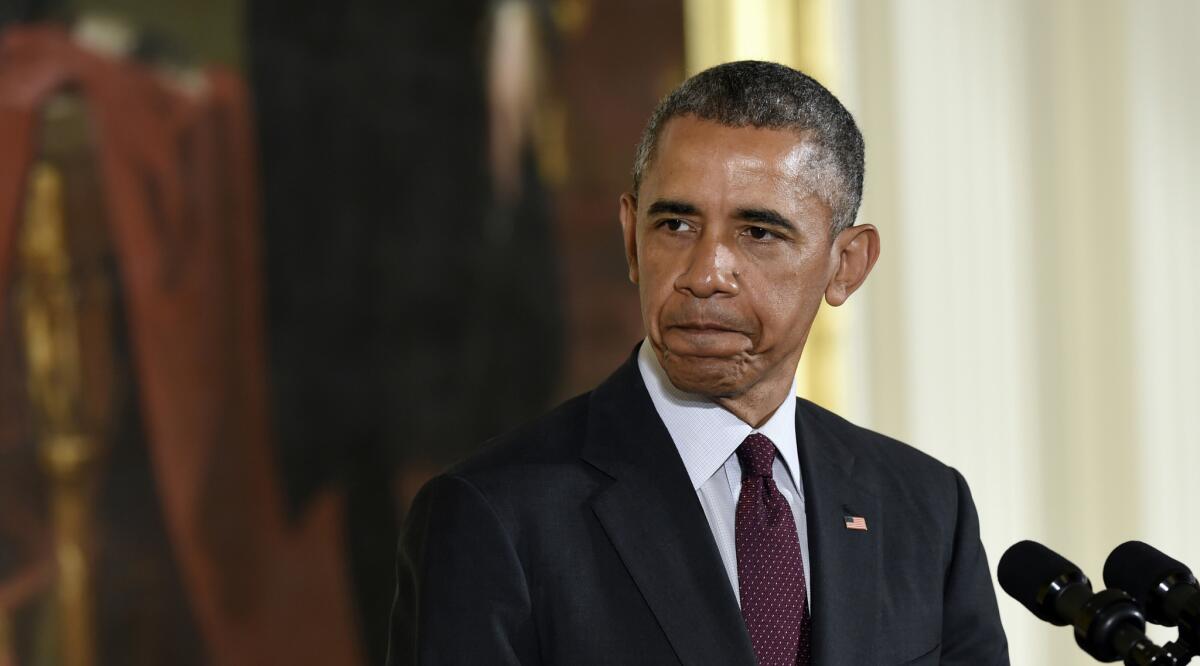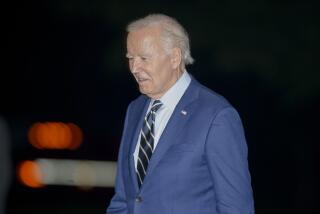Obama raises possibility of allowing U.N. vote on Palestinian statehood

President Obama said in an interview published Tuesday that it is a challenge for the U.S. to keep demanding the Palestinians negotiate in good faith on the Mideast peace process without a sign that Israel is doing the same.
Reporting from Washington — President Obama took a step toward a tougher line with Israel in an interview released Tuesday, raising the possibility that the U.S. will allow a United Nations vote on issues related to the Palestinians if the two sides make no meaningful movement toward peace.
In an interview with an Israeli television station, Obama noted that his administration has “up until this point” quashed such efforts at the U.N. while insisting that the Israelis and Palestinians must negotiate a resolution. But he said it is a challenge for the U.S. to keep demanding that the Palestinians negotiate in good faith if no one believes the Israelis are doing the same.
“How do we move off what appears right now to be a hopeless situation and move it back towards a hopeful situation?” Obama asked in the interview. “That will require more than just words. That will require some actions. And that’s going to be hard work, though, because right now I think there’s not a lot of confidence in the process.”
The comment was the latest sign that Obama has concluded that the U.S. must rethink its stance on the Mideast peace process if it is to maintain credibility in the world.
His thinking on the matter was clearly spurred this spring by Israeli Prime Minister Benjamin Netanyahu’s stand against Palestinian statehood during his election campaign. Even though Netanyahu has since publicly reversed his position, Obama said in the interview that Israel “as a whole loses credibility” on the point.
“If, in fact, there’s no prospect of an actual peace process, if nobody believes there’s a peace process, then it becomes more difficult to argue with those who are concerned about settlement construction, those who are concerned about the current situation,” Obama said. “It’s more difficult for me to say to them, ‘Be patient and wait because we have a process here’ -- because all they need to do is to point to the statements that have been made saying there is no process.”
Obama’s critical tone toward Netanyahu, describing him as someone who is “predisposed” to “think perhaps that peace is naive,” appeared to return to the tough language that marked administration statements earlier this spring, around the time of the Israeli election. More recently, the White House had seemed to be trying to mend fences.
The apparent shift in tone seems “hard to understand,” said a Democratic strategist with close ties to the White House. Previous White House criticisms of the prime minister clearly strengthened Netanyahu electorally, he said, speaking on condition of anonymity to avoid alienating White House officials. “These kind of attacks don’t really hurt him. They help him.”
Obama’s veiled threat about Palestinian statehood lands hard at a time when the U.S. and other world powers are in high-stakes negotiations with Iranian officials to limit their country’s nuclear program. Israel deeply opposes the deal on the grounds that it will bolster Iran’s nuclear efforts and its economy and boost its aggression in the Middle East; some of Iran’s leaders have said Israel does not have the right to exist. The deadline for a deal, a major foreign-policy priority for Obama, is at the end of the month, and the president is already gearing up for the difficult sales job ahead of him if an agreement is reached. Congress has demanded a chance to review the deal, a point Obama has ceded, but the deep opposition from Israel could complicate his attempts to gain approval from U.S. lawmakers who ardently support Israel.
In advance of that prospect, Obama recently visited a prominent Washington synagogue to talk about his deep love of Israel. Close advisors and friends have tried to underscore the point, with former senior advisor David Axelrod telling Israeli Channel 2 that Obama feels a deep personal affinity for the Jewish people.
And in an interview with the Atlantic magazine last week, Obama also talked about his personal commitment to the security of Israel, and idea he mirrored in the new interview with Channel 2’s Ilana Dayan.
Obama told Dayan that the U.S. assistance to Israel on security, intelligence and military matters “doesn’t go away” because it is part of a “solemn commitment that I’ve made with respect to Israel’s security.”
But there may be a “practical consequence” if there are new resolutions introduced in the U.N., he said.
The peace process could become a bigger problem for Obama in his complicated ties with Israel, but analysts say he has been trying to simplify that relationship lately by explaining himself directly to the Israeli public.
As he prepares to talk about a possible resolution with Iran over its nuclear deal, said one, Obama’s primary message is about his intent.
“He has to persuade the Israeli audience that he is preoccupied with the security of Israel,” said Jon Alterman, head of the Middle East program at the Center for Strategic and International Studies. “Did wearing a kippa and speaking in a prominent synagogue do the trick? It certainly reinforced a sense of affinity and reassured some people of the nature of his ties to Israel.”
As he spoke with Dayan, Obama drew his own parallels between the African American experience and the Jewish one.
“In my mind, there is a direct line between the Jewish experience, the African American experience, and as a consequence, we have, I hope, a special empathy and a special regard for those who are being mistreated because of the color of their skin or the nature of their faith,” Obama said.
Times staff writer David Lauter contributed to this report. For more White House coverage, follow @cparsons and @mikememoli
ALSO:
Long a torch-bearer for Tiananmen protests, Hong Kong now rethinks
Ukraine fighting flares after combatants retake surrendered weapons
Beloved Maggi noodles the focus of food scare in India
More to Read
Sign up for Essential California
The most important California stories and recommendations in your inbox every morning.
You may occasionally receive promotional content from the Los Angeles Times.












